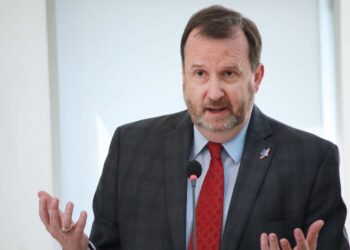In an exclusive interview with Euronews, Uzbekistan President Shavkat Mirziyoyev detailed the upcoming Central Asia-EU summit in Samarkand, a meeting he anticipates will reshape regional partnerships. Mirziyoyev spoke of deep historical roots and shared interests that drive the current push for closer ties with the European Union. He pointed to the summit’s unique position as a platform for leaders from five Central Asian countries and the EU to convene, a first in their collective history.
Mirziyoyev noted the rapid shifts in the global landscape, citing geopolitical instability, economic risks, and climate challenges as drivers for new forms of international collaboration. He revealed that trade between Central Asia and the EU quadrupled in the past seven years, reaching 54 billion euros, a clear indicator of growing economic ties. He attributed this growth to the rising interest of European businesses in Central Asian markets and the region’s strategic location at the crossroads of major global routes.
Samarkand, chosen for its historical significance as a center of trade, science, and diplomacy, provides a backdrop for these discussions. Mirziyoyev recalled Amir Temur’s historical interactions with European monarchs, framing Samarkand as a place where diverse cultures and ideas converge. He spoke of the “Samarkand spirit,” a concept of unity and indivisibility, as the foundation for a new form of international interaction.
Mirziyoyev addressed the transformations within Central Asia, emphasizing Uzbekistan’s commitment to good-neighborly relations and mutual benefit. He acknowledged past conflicts and disputes, but noted a shift towards constructive dialogue and trust. He cited the recent resolution of border disputes between Kyrgyzstan and Tajikistan as a tangible result of this approach. He spoke of ongoing efforts to develop border trade zones, joint investment funds, and transportation corridors.
During Uzbekistan’s chairmanship of the Central Asian Five, Mirziyoyev outlined priorities: strengthening regional security, deepening economic integration, and environmental sustainability. He conveyed a sense of opportunity, stating, “We are facing a historic chance to make our region not only sustainable but also prosperous.”
Mirziyoyev discussed Uzbekistan’s economic reforms, including the creation of a favorable business environment and the liberalization of the foreign exchange market. He expressed optimism that the Enhanced Partnership and Cooperation Agreement (EPCA) with the EU would further strengthen trade and investment ties. He proposed aligning the EU’s Global Gateway strategy with regional transport projects, and developing an Action Plan for the Trans-Caspian Transport Corridor.
Regarding energy, Mirziyoyev positioned Central Asia as a reliable partner for Europe, capable of contributing to energy stability and decarbonization. He mentioned the Green Strategic Corridor project and the potential for a Central Asia-EU Clean Energy Partnership. He detailed Uzbekistan’s plans to increase renewable energy capacity and reduce greenhouse gas emissions.
Mirziyoyev addressed security concerns, acknowledging shared threats such as terrorism and cybercrime. He emphasized the need for continued cooperation with the EU in these areas. He then turned to Afghanistan, outlining Uzbekistan’s pragmatic approach of engagement. He cited progress in stabilizing the situation and reducing opium cultivation, and called for Afghanistan’s integration into global economic processes.
On climate change, Mirziyoyev highlighted Central Asia’s vulnerability and called for joint action with the EU. He proposed a Green Partnership, focusing on renewable energy, ecosystem restoration, and water conservation. He also mentioned the Green Belt of Central Asia initiative and the establishment of a Green University.
Mirziyoyev expressed high expectations for the summit, anticipating the signing of the Samarkand Declaration, which he believes will solidify a strategic partnership. He emphasized the deepening of political dialogue and the development of new mechanisms for cooperation.
In his final message to European leaders and citizens, Mirziyoyev conveyed Central Asia’s openness to dialogue and increased interaction. He expressed appreciation for the EU’s support and reiterated the goal of transforming Central Asia into a united and dynamic region. He concluded with optimism, stating that the summit would open new prospects for cooperation.









